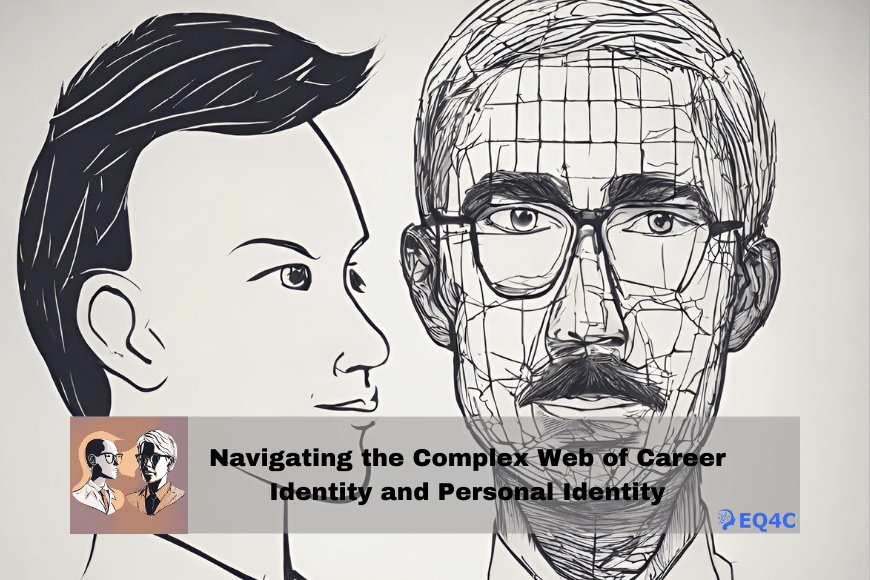Navigating the Complex Web of Career Identity and Personal Identity

In our life, we often find ourselves at the crossroads where career and personal identity intersect. Therefore, it is essential to understand how navigating the complex web of Career Identity and Personal Identity can help you in carving a more fulfilling life.
To make good choices, it is important to understand what is involved in these two characters, and the complex dance they play in our lives.
Choosing a career is your professional personality. It is a combination of your career, skills, goals and purpose in the world of work. Not just what you do, but who you are in your work.
On the flip side, we have Personal Identity. Personal identity goes beyond our professional roles. It looks deeply into who we are as individuals. We have a complex mix of beliefs, values, cultures and experiences.
That makes you, well, you.
What is Career Identity
Career Identity is the mirror reflecting your professional self. It’s more than your job title; it encompasses the very essence of your professional existence.
At its core, Career Identity consists of:
- Your chosen profession.
- Your acquired skills and expertise.
- Your career aspirations and goals.
- Your sense of purpose and fulfillment within the working world.
This isn’t just what you do from 9 to 5; it’s who you become in the process.
Perspectives on Career Identity
Understanding Career Identity means tapping into the insights of scholars who have explored this intricate web. Let’s examine a few key perspectives:
1. Erik Erikson’s Stages of Psychosocial Development
Erik Erikson, a renowned psychologist, believed that our careers play a pivotal role in shaping our sense of self. According to his theory, as we progress through life, each stage presents an opportunity to form a coherent identity.
A significant part of this identity development takes place in our careers. Your job isn’t just a paycheck; it’s a canvas upon which you paint your identity.
2. John Holland’s Theory of Career Choice
John Holland introduced a theory that suggests our career choices are an extension of our personality types.
He proposed that there are six fundamental career personality types: Realistic, Investigative, Artistic, Social, Enterprising, and Conventional.
The congruence between your personality type and your career choice influences your Career Identity. A harmonious match can lead to greater job satisfaction and a stronger sense of self.
Evolving Nature of Career Identity
If you at today’s modern world, Career Identity is more dynamic than ever. It’s not just about sticking to one career path for life.
Contemporary perspectives recognize the fluid nature of careers. People switch, pivot, and explore multiple paths during their working lives.
Career Identity now embraces adaptability, versatility, and the courage to pursue passions, even if it means switching tracks.
Let’s Explore few Examples Illustrating Career Identity
The most compelling way to understand Career Identity is by observing it in action. Let’s consider a few real-life examples:
- Elon Musk: The tech visionary’s career identity is not merely that of a business magnate. It’s marked by an unrelenting pursuit of innovation and a commitment to transforming the future of humanity through endeavors like Tesla, SpaceX, and Neuralink.
- Malala Yousafzai: Malala’s career identity goes beyond her occupation as an activist and Nobel laureate. It’s defined by her unwavering dedication to girls’ education, equality, and human rights, making her a symbol of resilience and hope.
- Teachers Worldwide: Teachers around the world are more than just educators. Their career identities are defined by their role in shaping young minds, instilling knowledge, and molding future leaders. It’s a career that’s closely tied to their sense of purpose and the impact they make on society.
What is Personal Identity
Personal Identity is the heart of who you are when you step outside the workplace. It’s a rich tapestry basically woven from your beliefs, values, experiences, and cultural influences.
At its core, Personal Identity comprises:
- Your fundamental beliefs and values that guide your decisions.
- Your life experiences that shape your perspective.
- Your cultural background and social context that mold your identity.
- Your interpersonal relationships and roles in various aspects of life, from family to community.
This is your essence outside the professional realm, and it’s as unique as your fingerprint.
Perspectives on Personal Identity
Unraveling the complexities of Personal Identity requires insight from scholars who have contemplated its intricacies.
Let’s explore a few key perspectives:
1. Philosophical Views on Personal Identity (e.g., Locke, Parfit)
Philosophers like John Locke and Derek Parfit have delved into the philosophical aspects of Personal Identity.
- Locke proposed the notion of personal identity as the continuity of consciousness. He argued that a person remains the same as long as they have the same consciousness and memories.
- Parfit, on the other hand, examined the nature of identity over time. He suggested that personal identity is not as robust as we might think and that it’s more about psychological continuity than physical continuity.
These perspectives offer a deep understanding of the philosophical underpinnings of Personal Identity.
2. Psychosocial Development and Identity Formation
Psychologist James Marcia’s work dives deep into psychosocial development and identity formation. Marcia proposed a model that categorizes individuals into four identity statuses: identity diffusion, foreclosure, moratorium, and identity achievement.
This model helps us understand how personal identity evolves during adolescence and beyond, often through exploration and commitment.
3. Cultural and Social Influences on Personal Identity
Your Personal Identity is profoundly influenced by the cultural and social milieu you inhabit.
Your identity is not just an individual construct but a collective one shaped by your cultural heritage, societal norms, and the interactions you have with others.
Whether you’re a product of a particular culture, community, or social group, these influences significantly impact your Personal Identity.
Examples Showcasing Personal Identity Development
To grasp the true essence of Personal Identity, it’s enlightening to delve into real-life cases of individuals who have undergone remarkable identity development:
- Nelson Mandela: The late South African leader’s personal identity was not just about being a lawyer, activist, or president. It was defined by his unwavering commitment to justice, reconciliation, and the fight against apartheid. His personal identity was intrinsically linked to his role as a peacemaker and symbol of unity.
- Oprah Winfrey: Oprah’s personal identity extends far beyond her media mogul status. It’s characterized by her journey from adversity to success, her advocacy for women’s empowerment, and her dedication to philanthropy and education.
- Immigrants and Cultural Identity: Immigrants, often navigating between two or more cultural identities, exemplify the influence of culture on Personal Identity. Their experiences shed light on how culture shapes values, behaviors, and a sense of self.
The Interplay Between Career and Personal Identity
The connection between Career Identity and Personal Identity is profound, intricate, and ever-present.
These two facets of our lives are like intertwined threads, influencing and shaping each other.
At its core, the connection can be seen as a dynamic dance, where your professional persona and your personal essence move in harmony, creating the rhythm of your life.
How Career Choices Impact Personal Identity
The career choices you make are not mere waypoints on your professional journey; they are pivotal in shaping your Personal Identity.
Your job is more than a source of income; it’s a substantial influence on your sense of self-worth, values, and how you perceive your place in the world.
Whether you’re a teacher, a doctor, or an artist, your career identity isn’t just what you do; it’s who you become while doing it.
On the flip side, your Personal Identity plays a significant role in steering your career choices. Your values, beliefs, and convictions are the compass that guides your decisions.
When your career aligns with your personal values and passions, it feels like a natural extension of who you are. It’s more than just a job; it’s a calling.
It is essential to look into the academic perspectives that shed light on the intricate intertwining of Career and Personal Identity:
1. Identity Theory and Its Application to the Career-Personal Identity Relationship
Identity theory posits that your sense of self is not static; it’s a dynamic process. Your Career Identity and Personal Identity are closely connected, with each influencing the other.
For example, if you identify as a dedicated healthcare professional, your sense of self extends into your personal life. Your compassion and commitment become integral parts of your Personal Identity.
2. Research on Work-Life Balance and Its Effects on Identity
The balance between your career and personal life is a critical factor. It’s not a matter of choosing one over the other; it’s about finding the equilibrium that allows both to thrive.
Research in this area has illuminated the effects of work-life balance on your identity. Striking the right balance ensures that you’re not just a professional, but a well-rounded individual.
It prevents burnout and maintains your sense of self intact.
The Importance of Keeping Them Separate
While the interplay between Career and Personal Identity is enriching, it’s not without its potential pitfalls.
The blurring of lines between these identities can lead to challenges that affect your overall well-being.
One significant pitfall is the risk of losing your sense of self in your career. When your professional identity overshadows your personal one, you may find yourself in a state of imbalance.
This imbalance can manifest as burnout, strained relationships, and a sense of emptiness.
Individuals who invest excessively in their careers often face an array of struggles. Their single-minded pursuit of professional success may come at the expense of their personal lives.
This can lead to strained relationships, isolation, and a sense of disconnection from their authentic selves.
These struggles highlight the importance of maintaining a balanced approach to career and personal identity.
Strategies for Balancing and Nurturing Both Identities
Maintaining a robust balance between your Career Identity and Personal Identity is a skill that can lead to a more fulfilling life. Here are some practical tips to help you nurture both aspects of your identity:
- Set Clear Boundaries: Clearly define when your workday starts and ends. This separation fosters a sense of personal time that is invaluable for maintaining a strong personal identity.
- Embrace Your Hobbies: Cultivate your interests and hobbies outside of work. These activities can help you maintain a sense of self and recharge your energy.
- Stay True to Your Values: Ensure that your career choices align with your personal values and beliefs. This alignment can lead to a greater sense of fulfillment and purpose.
- Take Time for Self-Reflection: Regularly reflect on your career and personal life to ensure they are in harmony. Self-awareness is the cornerstone of maintaining this balance.
Navigating Transitions and Changes in Life and Career
Life is replete with transitions and changes, both expected and unexpected. Navigating these shifts while preserving the equilibrium between your Career Identity and Personal Identity is essential. Here’s how to do it:
- Adaptability: Embrace change and adapt to new circumstances. Your identity is not static; it can evolve and adapt as needed.
- Resilience: Develop resilience to weather the storms that life and career transitions bring. Resilience helps you maintain a sense of self even in turbulent times.
- Seek Support: During transitions, seek support from friends, family, mentors, or therapists. Having a support system can make the journey smoother and less isolating.
Learn from Successful Individuals with a Balanced Approach
To provide inspiration and guidance, let’s explore the lives of individuals who have successfully balanced their Career Identity and Personal Identity:
- Warren Buffett: The celebrated investor, despite his immense success in the financial world, has maintained a down-to-earth personal identity. He’s known for living a modest personal life, which is a testament to his ability to keep both identities separate and balanced.
- Michelle Obama: The former First Lady of the United States has juggled a high-profile career with a strong personal identity. Her commitment to family, health, and social causes showcases how a career in the public eye can coexist with a robust personal life.
- Working Parents: Countless working parents, from all walks of life, navigate the delicate balance between career and personal identity every day. Their experiences serve as a testament to the possibility of maintaining both identities harmoniously.
A Quick Recap
In exploring our career identity and personal identity, we have unearthed a weave of insights that reveals the intricate dance between these two aspects of our lives.
Let’s recap the key takeaways:
- Career Identity is more than a job title; it encompasses your profession, skills, goals, and sense of purpose.
- Personal Identity delves into your beliefs, values, experiences, and cultural influences, shaping the core of who you are.
- The connection between Career and Personal Identity is dynamic, with each influencing the other.
- Career choices impact your Personal Identity, as they often define your sense of self-worth and purpose.
- Personal values and beliefs steer your career choices, allowing you to find fulfillment in your professional endeavors.
- Scholars have offered profound insights into how these identities intertwine and influence each other, emphasizing their dynamic nature.
- Maintaining a healthy balance between Career and Personal Identity is crucial, as conflating the two can lead to pitfalls.
- Struggles can arise when individuals invest too much in their careers, potentially impacting their personal lives.
- Strategies such as setting boundaries, self-reflection, and seeking guidance can help you maintain this equilibrium.
The importance of understanding, balancing, and sometimes separating Career and Personal Identity cannot be overstated. These two identities, while inherently interconnected, need room to breathe independently.
Balancing them ensures a fulfilling and prosperous life where you thrive both in your career and as an individual. Your career is not just a job; it’s an integral part of your identity. Likewise, your personal life is not a separate entity; it’s intertwined with your professional journey. Striking this balance brings harmony and well-being.
A Word from EQ4C
As we draw this exploration to a close, we encourage you, our readers, to embark on your own journey of self-discovery.
Explore your Career Identity and Personal Identity. Reflect on how they intertwine, how they influence one another, and where they should be kept separate.
Make informed choices in your career, aligning them with your personal values and beliefs.
Seek the delicate balance that allows both facets to flourish.
You have the power to create your own, unique identity. So always think about creating a life that’s both professionally rewarding and personally fulfilling.




